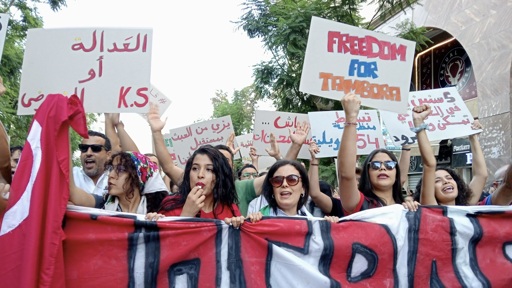Four years after Tunisian President Kais Saied’s power grab – widely labeled a coup – the country finds itself in a deepening spiral of authoritarianism, economic turmoil, and social fragmentation.
On July 25, 2021, riding on a wave of public frustration over a decade of political deadlock and economic stagnation, President Saied suspended parliament, dismissed the government, and seized executive powers. Framing his actions as a mission to “fight corruption” and “restore national sovereignty”, Saied sidelined opponents and pledged to fulfill the unachieved aspirations of the 2011 revolution.
But four years later, the reality in Tunisia contradicts the lofty rhetoric.
“None of the promises have been fulfilled. Instead, Tunisia has regressed politically, economically, and socially,” says a statement from the Workers’ Party,
“Four years have passed, and none of what was promised to our people has been achieved, except for the escalation of misleading populist rhetoric that claims victory for the nation and the people, while in reality, the opposite is being reinforced. The conditions of the nation and various struggling and popular classes and segments have witnessed a horrific deterioration in all fields.”
Tunisians today face soaring inflation, persistent shortages of basic commodities – food inflation stands at 7.8%, hitting lower-income households the hardest – and deteriorating public services, including frequent water and electricity cuts. Youth unemployment, already at 16%, continues to climb. And despite President Saied’s anti-corruption pledges, there is widespread erosion of public trust in institutions.
The government’s only solution seems to be loans from foreign governments and financial organizations, which are accompanied by debilitating austerity measures such as budget cuts. Faced with a pervasive crisis, Kais Saied has scapegoated migrants from sub-Saharan countries and has accepted funds from the European Union for controlling migration.
Authoritarian turn and repression
Saied’s rule has consolidated into what many critics now openly call an authoritarian regime. A new constitution, rammed through in a low-turnout referendum in 2022, dismantled Tunisia’s post-2011 semi-parliamentary system and replaced it with near-absolute presidential powers. The parliament, now consisting of two weakened chambers, operates largely as a rubber-stamp body.
The Workers’ Party statement alleges that political freedom has been gutted, the judiciary has been tamed, and the Constitutional Court remains absent. Decree 54, a controversial law passed in 2022, criminalizes criticism with vague charges, such as “spreading false news”, and has been used to imprison journalists, bloggers, opposition politicians, unionists, and social activists.
Read more: Ali Jallouli: ‘The Tunisian people are against absolute autocracy’
In 2024, Saied secured a second presidential term in an election marked by a record-low turnout of an abysmal 28%, as leading opposition candidates were either imprisoned or barred from participating. Most major political parties boycotted the election, questioning the credibility of the process.
Read more: Workers’ Party of Tunisia calls recent elections a “charade” and says Saied has no legitimacy
Over the past four years, Tunisia has witnessed a sharp decline in civil liberties. A growing number of political opponents, critics, and civil society actors have been targeted through politically-motivated investigations and arrests. Those targeted include visible opposition figures such as:
Moncef Marzouki, former president, sentenced to 4 years in prison in 2021, 8 years in 2024, and 22 years in 2025 – all in absentia.Hamadi Jebali, former prime minister, arrested on charges of money laundering and later released.Rached Ghannouchi, leader of the Ennahda party, sentenced to 14 years in prison in July 2025.Nearly all key figures who contested Saied in the 2019 presidential race, charged with violations such as “illegal online advertising and breaching electoral silence laws”.
The regime has also continued to suppress the right to protest through violent crackdowns, arbitrary arrests, and the criminalization of dissent, according to Amnesty International.
Resisting authoritarianism
The Workers’ Party reaffirmed its early stance that the July 25 events were not a rupture with the old system but a reconfiguration of it, “as a coup from within the reactionary ruling system to save the system of clientelism and exploitation in general by liquidating freedoms and returning the country to dictatorship.”
In the past four years, the Saied administration has “solidified an authoritarian, fascist, individualistic ruling system that is hostile to freedoms. It has liquidated, or nearly liquidated, the gains of the democratic revolution and barren public life. It is working to destroy manifestations of political, trade union, and civil popular organization in favor of a populist, treasonous orientation that is hostile to “intermediate bodies” with the aim of depriving the people, especially workers and laborers, of self-defense tools, foremost among them organization.”
“There is no way out except through struggle,” the statement concludes, rallying Tunisians to organize and resist a return to tyranny and clientelism.
The post Tunisia’s authoritarian spiral tightens, four years after the coup appeared first on Peoples Dispatch.
From Peoples Dispatch via this RSS feed


